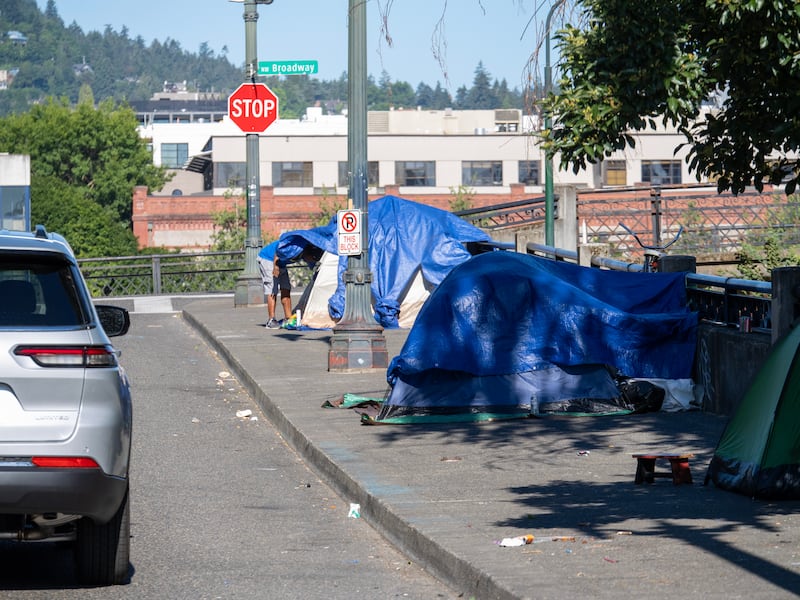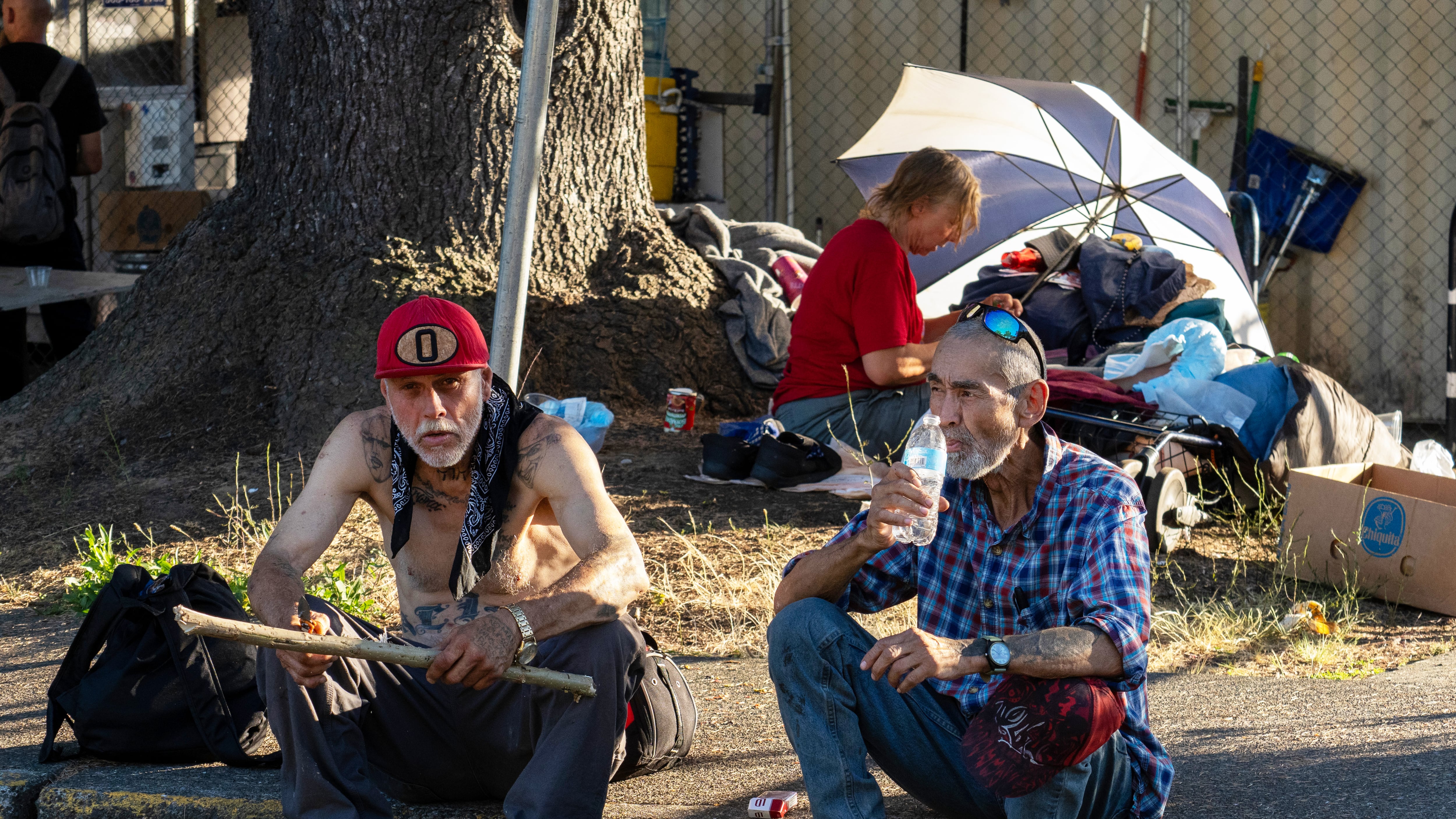Jarrod Laine awoke June 28 in the same place he does every morning: in his truck.
Laine, 57, was parked in front of a warehouse on Portland’s Central Eastside. The bed of his Ford F-150 was piled with crates and a push cart, the windshield covered with a sun reflector to take the teeth out of the day’s heat. “It’s getting pretty old,” he said, over the blare of traffic from Southeast Grand Avenue.
But beyond Laine’s makeshift home, the world had shifted slightly.
Shortly after dawn on the Pacific Coast, the U.S. Supreme Court issued its long-awaited opinion in City of Grants Pass, Oregon v. Johnson, considered by the National Homelessness Law Center to be “the most important Supreme Court case about homelessness in 40+ years.”
The landmark case had its roots in Oregon—specifically, Grants Pass, a town of 38,000 near the California border that cracked down on unhoused campers.
A group of unhoused Grants Pass residents sued their city government back in 2018, alleging that city laws punishing sleeping in public with fines and jail time violated their constitutional rights. On June 28, in between rulings on abortion and presidential immunity, the nation’s high court disagreed and sided with Grants Pass in a 6-3 vote along the usual ideological lines.
On its face, the ruling gives cities nationwide the green light to slap people with tickets or jail for sleeping in public—even if there is nowhere else to go. It overrules a lower court decision that had placed some limits on camping bans in Oregon and other western states since 2018.
But homeowners who want to see the uprooting of tent encampments across the state shouldn’t celebrate just yet.
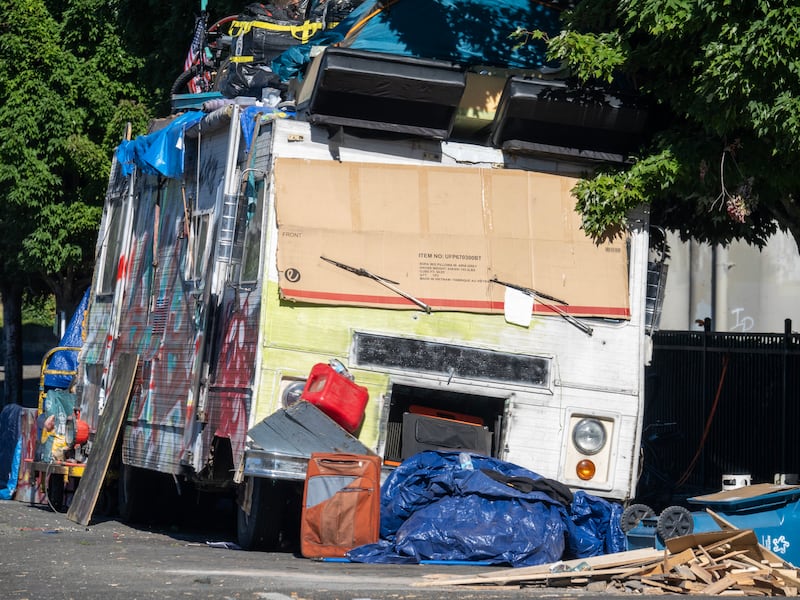
In a twist of fate, while the case began in this state, it changes little in Grants Pass—or anywhere else in Oregon.
“We do not anticipate any immediate changes at the local level as a result of this decision,” says Beaverton Mayor Lacey Beaty.
That’s because the state passed a law in 2021 that outlaws camping bans like the one in Grants Pass. The law’s chief architect: then-House Speaker Tina Kotek, now governor.
In a statement, Kotek defended the law and said that many cities have “appropriately” responded by making reasonable accommodations for unhoused campers. Her office declined a request for an interview.
The high court’s conservative majority is broadly reviled by Oregon Democrats. And yet, in another irony, some of them are now agitating Kotek to free Oregon’s cities to use the powers granted them by justices like Samuel Alito and Brett Kavanaugh.
Even in Portland, which has a national reputation for leniency with encampments, city officials had petitioned the court to do exactly what it did. (The city signed on to an amicus brief submitted by the League of Oregon Cities.)
“The city wants clean sidewalks. We don’t want encampments in the city,” Portland City Commissioner Rene Gonzalez tells WW. “And we also want people to have shelter and services.”
The jumble of jurisdictions affected could make you dizzy. The court’s decision didn’t outlaw camping on sidewalks—instead, it tossed the question back to each city and state. And in Oregon, that sets up the next big fight in a series of tussles over cracking down on the visible symptoms of homelessness.
In the coming pages, we’ll attempt to make sense of what the court ruling means for Oregonians—both those in the halls of power and those sleeping on sizzling sidewalks.
What did the city of Grants Pass do to people sleeping outside?
First of all, Grants Pass has a housing problem. The town, which straddles Interstate 5 an hour north of the California border, has grown at a fast clip. The population increased 14% from 2012 to 2022, outpacing growth in Salem and Eugene.
That strained its housing stock. Of a population of 38,000, Grants Pass has about 600 people who are homeless, and more than 1,000 are “precariously housed,” according to a court filing by the Oregon Law Center, which represented unhoused locals in the case. That means about 1% of residents have nowhere to sleep. Encampments have been a familiar sight in Grants Pass for a decade, and other town residents have long pressured local officials to remove them.
A decade ago, in 2013, the city held a public meeting on combating “vagrancy.” Officials complained that unhoused people who were given outbound bus tickets quickly came back. Even then, officials directed police to ramp up enforcement of the city’s camping ban.
“The point is to make it uncomfortable enough for them in our city so they will want to move on down the road,” said then-City Council President Lily Morgan.
The ban outlawed resting in public with the aid of a sleeping bag or other bedding. First-time violators were hit with a $295 fine. Failure to pay spelled up to 30 days in jail and a $1,295 fine. It was common for destitute locals to rack up fines and charges, according to court filings. At the time, Grants Pass had no homeless shelters and two privately operated housing programs, lawyers for the unhoused residents say.
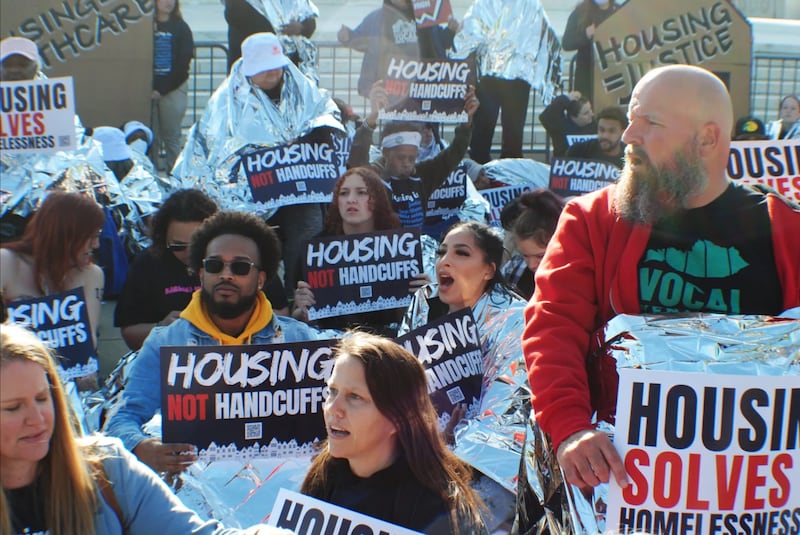
How did that ban end up in front of the Supreme Court?
In 2018, the 9th U.S. Circuit Court of Appeals ruled that an anti-camping ordinance in Boise, Idaho, constituted cruel and unusual punishment against unhoused people because the city didn’t provide them anywhere else to go. The decision, Martin v. Boise, still allowed local governments to restrict sleeping in public if shelter was available, and it applied only to the Western U.S.
The ruling shaped homelessness policy up and down the West Coast for six years. It opened up cities to lawsuits by unhoused people for enacting camping bans that didn’t accommodate people with any other option.
Within weeks of the Martin v. Boise ruling, the Oregon Law Center filed a lawsuit in federal court against Grants Pass on behalf of unhoused residents.
Lawyers with the Oregon Law Center argued that Grants Pass had made it “physically impossible” for unhoused people to live there without retribution, violating their constitutional rights. In response, the city of Grants Pass said camping restrictions were necessary to address the “crime, fires, the reemergence of medieval diseases, environmental harm, and record levels of drug overdoses and deaths on public streets” that characterize the region’s homelessness crisis.
And for six years, the case made its way through the courts, until June 28, when the Supreme Court ruled in favor of Grants Pass, overturning Martin v. Boise and its limits on camping bans.
Justice Neil Gorsuch penned the majority opinion. Gorsuch wrote that Grants Pass’ camping rules weren’t cruel because they were not designed to spread “terror, pain or disgrace.” Nor were they “unusual” because “limited fines and jail terms have been and remain among the usual modes for punishing criminal offenses throughout the country,” he wrote.
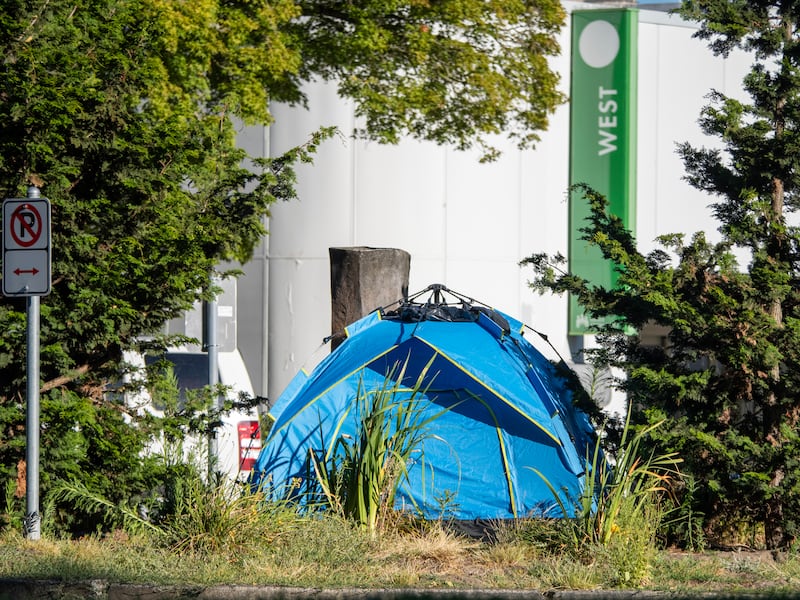
Did the Supreme Court just say it’s a crime to be homeless?
It depends on whom you ask.
The court’s ruling won’t make homelessness itself a crime, but it does allow cities to criminalize the main consequence of it: sleeping in public.
In the majority opinion, Gorsuch found the Grants Pass camping rules permissible partly because, in his view, they didn’t criminalize the status of being homeless. Instead, they placed restrictions on camping in public that applied to everyone—not just an unhoused person.
“It makes no difference whether the charged defendant is currently a person experiencing homelessness, a backpacker on vacation, or a student who abandons his dorm room to camp out in protest on the lawn of a municipal building,” Gorsuch wrote.
That didn’t satisfy Justice Sonia Sotomayor, who wrote the court’s dissenting opinion.
“The ordinances’ purpose, text, and enforcement confirm that they target status, not conduct. For someone with no available shelter, the only way to comply with the ordinances is to leave Grants Pass altogether,” Sotomayor wrote.
Ed Johnson, an attorney who represented unhoused Grants Pass residents as director of litigation for the Oregon Law Center, says the ruling doesn’t require cities to ban camping or stop them from opening shelters or building low-income housing.
“Nothing in the court’s opinion…requires cities and states to do the wrong thing and to punish our vulnerable neighbors who have been priced out of the housing market,” Johnson says.
But that still means the Supreme Court sanctioned what Grants Pass did, right?
The ruling is a vindication for Grants Pass, which waged a yearslong legal battle to defend its camping ban.
“This lawsuit was about whether cities have a right to enforce camping restrictions in public spaces, and I’m relieved that Grants Pass will be able to reclaim our city parks for recreation,” Mayor Sara Bristol said in a statement.
However, Grants Pass itself is taking a more lenient approach to unhoused campers, said City Council President Vanessa Ogier. Where police once ticketed campers, she said, city staff connects people with social services.
“The lawsuit has painted Grants Pass in a spirit that may no longer exist,” Ogier said. “That’s not to say that it never did.”
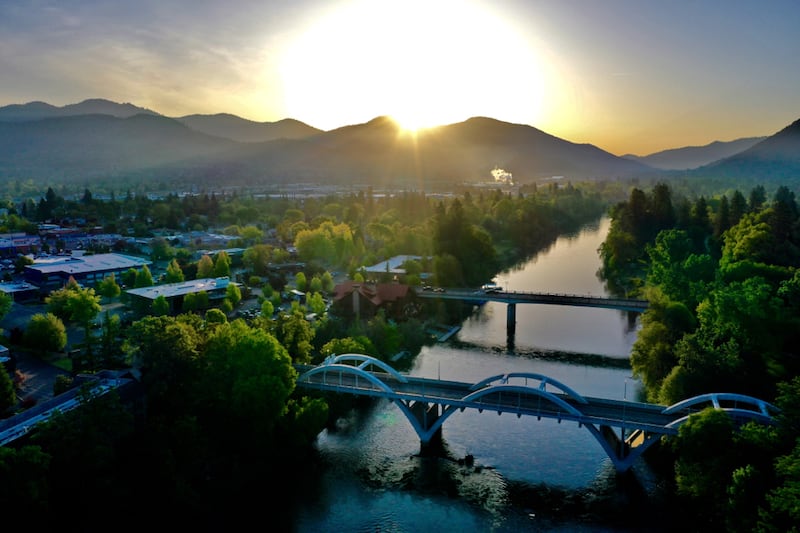
More broadly, cities in Washington, California, Idaho and other Western states now have freedom to emulate the strictest camping bans in the U.S., says Jesse Rabinowitz, a spokesman for the National Homelessness Law Center.
“We do anticipate that this will make it easier for cities and states across the country to pass or enact harmful laws that only result in people staying homeless longer and having more debt and more time in prison,” Rabinowitz said in a call with reporters.
A particularly draconian example, Rabinowitz pointed out, is a law in Florida signed by Gov. Ron DeSantis in March. It bans cities from allowing homeless people to sleep in public places and requires towns to build temporary camps monitored by police if there aren’t enough shelter beds available.
So now all cities can jail people for camping?
Not so fast.
The Supreme Court decision will allow states and cities to pass tough camping bans, but it doesn’t require them to. States are free to criminalize the act of sleeping outdoors, or to prevent cities from doing just that. Essentially, the ruling lets the states decide—a phrase you may recall also hearing after the Dobbs v. Jackson decision on abortion rights.
That creates a weird dynamic in the Northwest. In Idaho and Washington, cities can do what Grants Pass did—or something harsher. But oddly enough, Grants Pass can’t.
That’s because Oregon has a statewide law that limits camping bans. Kotek wrote it.
The state law, House Bill 3115, passed in 2021, says camping restrictions must include reasonable exceptions for unhoused people, and cities must provide adequate shelter if they go that route.
And in its ruling, the high court didn’t force Oregon to change its law.
The upshot: Grants Pass can’t time travel back to 2013, and neither can any other city that wants to indiscriminately round up homeless residents. At least, not on paper.
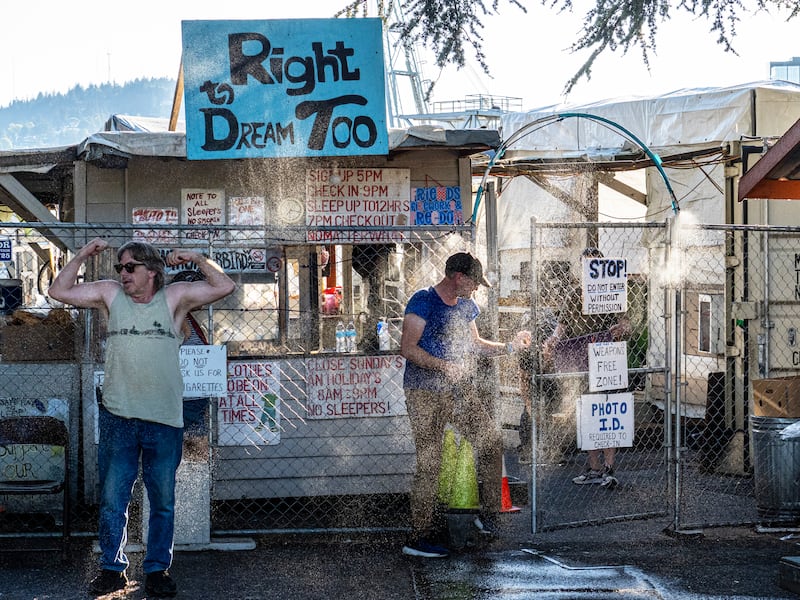
In a statement after the ruling, Portland Mayor Ted Wheeler said it “will have little or no impact on Portland because state law (HB 3115) continues to control and limit what Oregon cities can and can’t do.”
House Bill 3115 gave cities two years to craft “reasonable” restrictions on public camping. Medford, Bend, Salem, Portland and others have followed suit with new city codes.
They vary from city to city. In Bend, tent campers must now move every 24 hours or face a fine of up to $200, per the city’s code. In the past year, the ordinance dramatically reduced sprawling encampments, even though code enforcers haven’t given a single ticket, says Megan Perkins, a Bend City Council member who also sits on the city’s Coordinated Houselessness Response Office. Bend code enforcers—not cops—work collaboratively with unhoused people to get them off the streets, Perkins says. Meanwhile, Bend has more than doubled its shelter space in the past three years, according to Perkins.
House Bill 3115 also opened the door for unhoused residents to challenge camping bans in court. Some have done just that—with mixed results. In Bend, a federal judge dismissed unhoused residents’ allegations that the new city code violated their constitutional rights last year. The city of Medford also prevailed in April in a court challenge by unhoused locals.
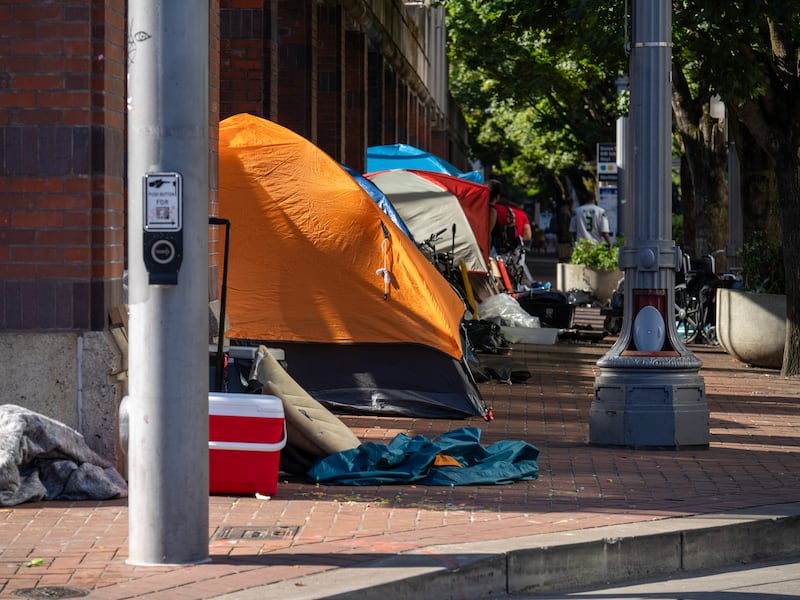
Is anyone going to try to reverse Oregon’s law?
The Supreme Court’s decision doesn’t force Oregon to change its state law, but it immediately turned up the heat on lawmakers to change it themselves.
“Kotek is dead wrong. This has not provided clarity to localities,” Portland’s Gonzalez tells WW. “It has become an impossible equation for cities.”
Gonzalez, Mayor Wheeler and Commissioner Mingus Mapps all want the Legislature to revisit the law.
They found an audience in Senate Minority Leader Daniel Bonham (R-The Dalles), who says the law lacks clarity. The League of Oregon Cities is “scrambling” to comply, he says. (In a statement, a spokesperson for the league said it was too soon to comment on its policy preferences after the court ruling.)
“We do owe it to cities to have them at the table…and work this out,” Bonham tells WW.
Two Democratic state lawmakers also want to roll back House Bill 3115, Oregon Public Broadcasting first reported.
“The original law is ambiguous, and that is making it even harder and more confusing for local officials in light of the court’s decision,” Sen. Mark Meek (D-Gladstone) said in an email. Meek and Rep. Paul Evans (D-Monmouth) are looking for allies in their caucus this week.
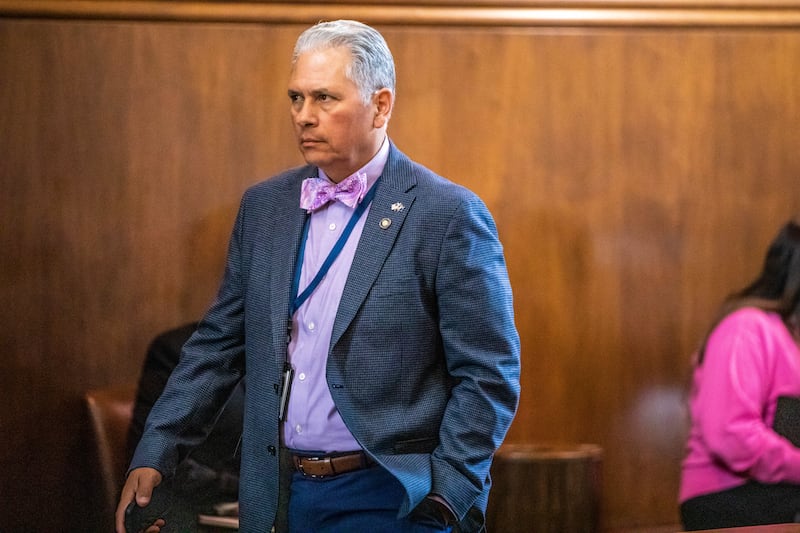
But the legislative appetite to reconsider the law appears weak. Rep. Pam Marsh (D-Ashland), who chairs the House Committee on Housing and Homelessness, says she hasn’t been part of any discussions to reconsider House Bill 3115. She says the law has driven “reasonable” camping restrictions and more shelter options in her district, which includes Ashland and part of Medford.
“I think 3115 has proved itself,” she adds.
Sen. Jeff Golden (D-Ashland) also said those conversations weren’t happening, and that his colleagues probably wouldn’t approve changes to the statute.
“I have a strong hunch that that’s not going to fly,” Golden says.
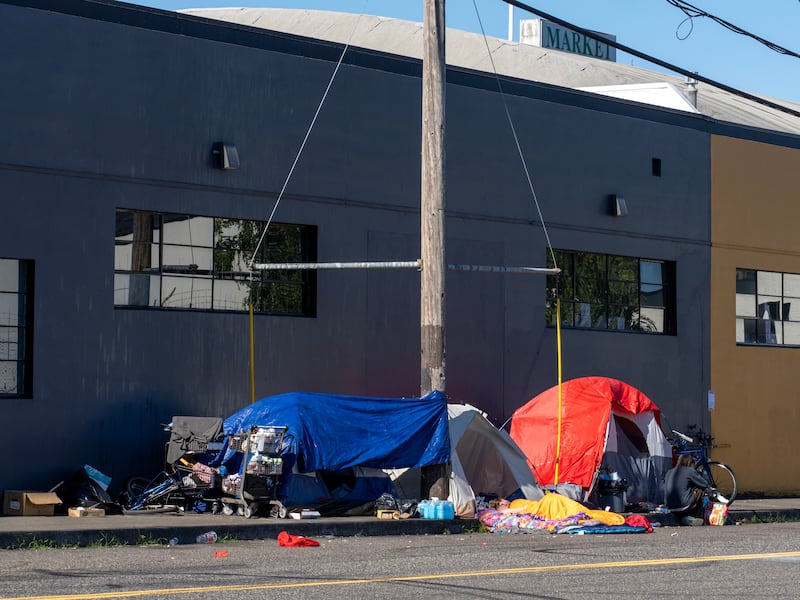
Wait, but doesn’t Portland have a camping ban?
It does. In fact, in a coincidence unrelated to the court decision, Wheeler sent city staff and police out to start enforcing the Portland ban last week.
But like the rules in Bend and Medford, Portland’s camping ban was crafted to comply with HB 3115. That means it only outlaws camping when shelter space is available. (Blocking sidewalks, using gas-powered heaters, and erecting permanent structures are all violations whether shelters are available or not.)
Under the plan, the city will dispatch staff from the city’s Street Services Coordination Center only to the most dangerous or disruptive encampments. Staff will decide whether to let residents be, conduct outreach or involve the police. People who refuse an offer for shelter, block a sidewalk with their tent, or otherwise violate the code could be fined $100 and jailed for a week.
It remains to be seen how aggressively the city will enforce it, says Scott Kerman, executive director of homelessness services provider Blanchet House.
“I think we’ll just have to see how it plays out,” he says.
Cody Bowman, a spokesman for Wheeler, says the new rules “will make a noticeable difference in improving livability.” Others have their doubts.
Does anybody want Portland’s rules to be stricter?
Mayoral candidate Rene Gonzalez advanced a dueling proposal in April, which would have given the mayor’s office more power to change camping rules. Unhoused people who violated the rules would have faced fines of up to $500 and six months in jail. Wheeler, Mapps and Commissioner Carmen Rubio voted against it.
Gonzalez wants to see House Bill 3115 repealed and Portland’s old camping ban reestablished—the one that was on the books since the early 1980s, but not enforced since the administration of Mayor Charlie Hales in 2015. In an interview with WW, Gonzalez said Portland’s current rules, which include a slew of exceptions on where and when unhoused people may camp, are too convoluted.
“On the books since the early days in the city of Portland was a broad prohibition on camping. Everyone could understand—a third grader could read it and understand. And there are substantial advantages in enforcement when there’s that kind of clarity,” Gonzalez said.
Jailing a person for camping would only be appropriate in rare cases, he added, if, say, someone repeatedly broke the law and refused help.
Will this be an issue in the mayor’s race?
Certainly. Commissioner Rubio, who is also running for mayor, said in a statement that the city must provide more shelters, housing and mental health services. She defended the current camping ban—and implicitly suggested she would fight against anything more stringent.

“I voted for the most recent camping ordinance because it strikes the right balance between humanity and accountability,” Rubio said. “We all want structures and rules to be in place that ensure everyone can use public spaces safely—no matter where you live or sleep.”
Rubio’s staff declined to make her available for an interview.
In other words, the race between Rubio and Gonzalez, the two leading candidates for Portland mayor, is a choice between Kotek’s law limiting camping bans or the freedom granted by the Supreme Court to broadly outlaw sleeping on the streets.
How do people living on the streets feel about this?
Surprisingly, Gonzalez and some unhoused people agree on one thing: The city’s current camping ban won’t change much.
Laine, who lives in his truck on the Central Eastside, said he had bigger fish to fry. Thieves recently tried to steal his truck while he was away, he said, damaging the ignition and leaving it undriveable. On a sweltering afternoon, Laine had just given up trying to fix it himself and had run out of water. At any rate, he wasn’t aware of the city’s new rules.
“Another one? They do that shit all the time,” Laine said.
Rob Los Ricos, who has lived outside in Portland for about five years, offered the same appraisal. “What does it really change, though? They were already doing that,” Los Ricos said.
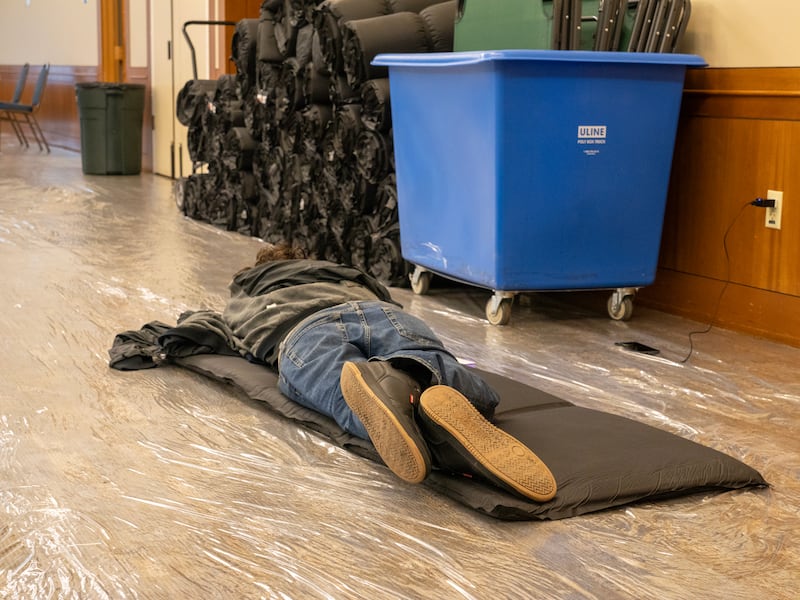
On July 1, Los Ricos gathered with a coterie of activists at the home of Jeff Liddicoat, a prominent anti-sweep activist who lives in a tent structure not far from Laine’s truck. Liddicoat has built an art gallery of small sculptures lining the sidewalk. Neighbors and activists pop in to visit him there.
Two days before Wheeler said he would begin enforcing the rules, city workers tacked a green notice of an illegal campsite to a tree near Liddicoat’s tent.
Rapid Response employees later arrived with police officers and city outreach staff. Liddicoat said he was offered a “pod” in the Clinton Triangle, an alternative shelter site run by California-based nonprofit Urban Alchemy. Liddicoat—who has lived outdoors on the Central Eastside for about 15 years—accepted.
It was a reluctant assent, however. He expects to split his time between the pod and his encampment. “The pod, over this?” he said, gesturing to his home, a large encampment with a small bed, paces from East Burnside. “This is comfortable, it’s mine, it’s got good lighting, there aren’t a bunch of jack-offs surrounding me.”
